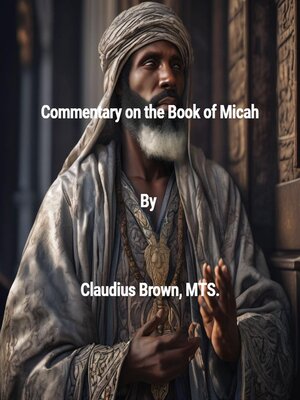
Sign up to save your library
With an OverDrive account, you can save your favorite libraries for at-a-glance information about availability. Find out more about OverDrive accounts.
Find this title in Libby, the library reading app by OverDrive.



Search for a digital library with this title
Title found at these libraries:
| Loading... |
The Book of Micah is one of the twelve minor prophets in the Old Testament of the Bible, and it is traditionally attributed to the prophet Micah, who lived during the 8th century BCE. This prophetic book consists of seven chapters and is a significant piece of Hebrew scripture. The name "Micah" means "Who is like God," and the book's content reflects the prophet's messages and visions concerning both the people of Judah and Israel, as well as their rulers and spiritual leaders.
The book is often divided into two main parts. The first part, chapters 1-3, primarily focuses on pronouncing judgments against the sinful practices, social injustices, and corruption that have permeated the society of Judah and Israel. Micah condemns the wealthy elites who exploit the poor and criticizes the rulers for their unethical behavior.
The second part, chapters 4-7, transitions to messages of hope and restoration. These chapters prophesy about the coming of the Messiah, the future peace and prosperity of God's people, and the ultimate deliverance of Israel. The famous prophecy in Micah 5:2 anticipates the birth of the Messiah in Bethlehem.
Micah's prophecies reveal his deep concern for justice, righteousness, and the relationship between God and His people. It is a call for repentance and a reminder of God's faithfulness, even in times of moral decay.
Overall, the Book of Micah serves as a profound reflection on the moral and ethical responsibilities of individuals and nations, a reminder of the consequences of wrongdoing, and a message of hope in the promise of God's salvation. It is an integral part of the biblical canon and continues to be studied and revered for its enduring relevance to issues of justice and faith.







